- Home
- Peter Straub
Mr. X Page 9
Mr. X Read online
Page 9
An endless second later, I was seated beside the immobilized Artillery Pledge Fletcher as glowing sparks fell and died in the air, especially around the end of the cot. I was stark naked and, despite the red-hot agony in my head and the tumult in my guts, brandished the sort of obdurate erection known at Fortress as “blue steel.” Artillery Pledge Fletcher’s mouth hung open, and his eyes were glazed. He stared at me, then at the place where I had been. A smell like that of burning circuitry hung in the room. I bent forward and closed the door with my fingertips.
Artillery Pledge Fletcher moved his vacant gaze to me, to the cot, then back to me. “Uhhh …” He recalled why he had come to my room. His trembling hand proffered the book. “I thought … I wanted to …” Pledge Fletcher’s eyes landed on my erection.
I slid the book from his fingers. My groin expanded into what from the standpoint of envious old age I must call remarkable dimensions.
Fletcher kept his eyes on the prize. “Well. I don’t…. That is, I didn’t …” His gaze snapped up to meet mine. “Aaah, when I came in I couldn’t really see what was going on. Probably I got dizzy. It’s sort of hot in here.” He looked down again. “Hey, keep the book. I have to get to mess.”
“No, you don’t,” I said.
He backed toward the door. I put the book on my desk, stood up, grasped his upper arms, and moved him sideways.
“Oh, Christ,” he said. “Look, I’ll get a late-for-mess tick, but if you want a Mary, I’ll give you one.”
A “tick” was a demerit, and “Mary” meant a “five-finger Mary,” school slang for masturbation. He was trying to bargain his way down from whatever else I might have had in mind. I had no idea of what I intended to do, apart from ensuring that he never leave the room alive. My frenum slid up the coarse fabric of his tunic, leaving a transparent glister like the track of a snail.
“Don’t cream all over my uniform.” He stepped to one side, settled his hand midshaft, and, not untenderly, moved it up and down as if he were milking a cow. I clamped my left arm around his waist, my right hand on his shoulder.
“What was that with the sparks?”
“I’ll explain later,” I said.
“Nuts to the tick. Do me afterwards.”
“Anything you want,” I said. Oh, the lies told by randy boys! Oh, the foolish young things who believe them!
My knees locked and my spine straightened. Ivory gouts flew across ten feet of floor and splatted against the window. Artillery Pledge Fletcher hooted, playfully aimed me at the ceiling and pumped on. A ribbon of melted ice cream hurtled up and struck the plaster. In almost scientific curiosity, he watched gruel stream over his knuckles and plop to the floor. “Amazing.”
I released my grip on him, he his on me. A flush mottled his face. He fumbled with his zipper and groped into his trousers.
“Thanks for the book,” I said, knowing for the first time since my experiments in the ruined house that I could freeze a human heart, and sent an icicle into his. Hand in his fly, Fletcher tumbled dead to the floor.
Whatever I decided to do with his body would have to wait until after curfew. I shoved him under the bed and dressed in my uniform, then used a towel to wipe the mess off the floor and the window. I stood on a chair and swabbed the ceiling. Then I settled down to read.
I might as well say: to experience an ecstasy more profound than sexual release. To witness the most hidden aspects of what I knew to be true about the world and myself laid bare in lines of type running across the receptive page. More than that, to learn that this sage, this prophet (a resident of Providence, Rhode Island, according to the infuriatingly cursory paragraph on the flap) had penetrated the Mystery far more deeply than I. Certain allowances had to be made due to the sage’s decision to present his knowledge in fictional form, but he confirmed the origins of my Mission and the nature of my Ancestors. He uttered their mighty names: Nyarlathotep, Yog-Sothoth, Shub-Niggurath, great Cthulhu.
The Dunwich Horror became my Genesis, my Gospels, my gnosis. In wonder and joy, I read through it twice, interrupted only by Artillery Pledge Fletcher’s roommates, pop-eyed future Rotarians named Woodlett and Bartland who burst in without bothering to knock and burst out again ten seconds later to go baying around the courtyard. Before beginning to devour the book a third time, I looked up and noticed the darkness beyond the window. The time was 3:00 A.M. I reluctantly closed the book, dragged the corpse from beneath my cot, transported it to a colonnade overlooking the dormitory courtyard, and dumped it over the side. It was a four-story drop onto the concrete, good enough, I thought. In my haste, I neglected to remove Fletcher’s hand from his fly.
This was the matter I had hoped the captain would leave unmentioned.
“After a fashion,” Squadron said. “He wasn’t a friend of yours.”
“I don’t have friends, remember?”
“You and he never passed the time of day, chewed the fat, anything like that.”
“Not that I recall,” I said.
“Artillery Pledge Fletcher brought us a great deal of unwelcome attention.”
The apparent suicide of a Fortress pledge had attracted national attention, and, although what appeared to be its autoerotic aspect was never officially announced, that Fletcher’s right hand had been in the “Mary” position at the time of death had spread rapidly through the school and its surrounding community, arousing a mixture of shock, distaste, and ribaldry. He had jumped to his death doing that?
The autopsy deepened the mystery. Fletcher had died as the result of a massive heart attack, not the fractures sustained by his fall from the colonnade. Not only had he been dead before his body struck the ground, the death had taken place between six and twelve hours before one or more people had dropped him onto the courtyard. Once again, police and reporters invaded the school. Everyone who had been present on the Friday evening before Christmas break, myself included, was questioned and requestioned in an attempt to determine where Fletcher had been at the time of his death, where his body had been hidden during the missing hours, and who had pitched it into the courtyard. A trace of semen belatedly discovered on his tunic led to the widely reported theory that the cadet had died in the midst of a “sex party,” and that his guilty partners had secreted the body until it could be disposed of in a manner they hoped to be taken for suicide.
The Fortress administration thundered that sexual misconduct was specifically forbidden by the Reg Book’s honor code. The administration’s final attempt at dampening the scandal was to announce that a depraved outsider had accosted Artillery Pledge Fletcher on the way to mess hall and had forced him into a remote area of the campus, where the fiend’s immoral advances had induced a heart attack, whereupon the fiend had lain in wait until he could so deal with the body as to place suspicion on the innocent. Artillery Pledge Fletcher had submitted to death rather than dishonor, and the school would inaugurate a Valor Cup in his name to be presented at each year’s awards convocation to the Artillery Pledge Who Most Typifies the Values Expressed in the Honor Code. I found it hardly unwelcome when this bilge carried the day. The story had long ago dropped out of the papers, and we had not seen a cop or reporter for at least a month. The only significant result of the investigations had been the expulsion of a notorious, much-missed Cavalry femme who, as if measuring fish he had caught, separated his hands by varying distances when other cadets’ names were mentioned.
“It’s interesting that you might have been the last person to see the pledge before he died,” Squadron said.
I shook my head in a display of wondering disbelief.
“The pledge tells his roommates he’s going to mess, and oh, on the way he might as well go up to your room to drop off this book you wanted to borrow, otherwise he might forget, he’ll see them at dinner, goodbye. He waltzes into your room, finds out you’re still here, and gives you the book. Right?”
“It was thoughtful of him,” I said. “He wanted to be sure I’d have it when I got back.” I smoothed m
y blanket with the palm of my hand.
“You couldn’t get this book from the library?”
All the times I had been questioned, no one had ever thought to ask about the book. The notion of showing it to Captain Squadron seemed filled with danger. “We don’t have it in the library. It was a collection of stories.”
“Like short stories?”
I smoothed another nonexistent wrinkle.
“What kind of stories?”
“I don’t know what you’d call them.”
“Let me have a look at it.”
I went to my desk and opened the top drawer. The hideous image of Squadron’s fingerprints contaminating the sacred text filled my mind. I held it up and gave him a look at the cover. He narrowed his eyes. “I never heard of the guy.”
“Me neither.” I put the book on my desk, relief at escaping what seemed like both pollution and danger making my heart thump. When I looked back at Squadron, he was frowning and holding out his hand.
“I thought you wanted …”
He waggled his fingers.
I surrendered the treasure to his waiting paw.
“You kids think these stupid tricks bamboozle everybody, but we’ve seen it all before.” He opened the book and flipped forward. When he failed to find pictures of naked women, he riffled the pages with his thumb. He folded back the cover and looked at the front binding. “You’re too jumpy. Something’s funny here.” Holding both covers, he upended the book and shook it. Nothing fell out of the pages.
Squadron tossed the book onto the dresser and leaned back again. “You didn’t go to the mess that night.”
“I wasn’t hungry.”
“Kids your age are hungry all the time, but let that pass. What do you think happened to Artillery Pledge Fletcher?”
“The commandant hit the nail on the head, sir. Some outsider jumped him between here and mess hall, and the pledge got so scared he dropped dead. I wish I’d gone with Pledge Fletcher. He wouldn’t have attacked the two of us.” I made the mistake of glancing at the treasure. Squadron saw my eyes move. Grinning, he slid the book to the edge of the dresser.
“No outsider has ever, and I mean ever, managed to sneak in here without being seen. It’s almost impossible to get in or out without passing a guard station. Breaking into the dorms, you have to set that up in advance, don’t you? Get a buddy to crack a window for you, talk him into hanging around a fire door?”
Once or twice a month, a reckless cadet who had escaped into town regained entry to the dorms by precisely those means. “I don’t know anything about that.”
He folded his arms over his chest and tilted his head to one side, still smirking at me. “But since this is between you and I, we both know the commandant’s story is horse puckey, don’t we?”
I did my best to look puzzled. “Sir, I don’t understand.”
“I probably don’t, either. But here’s what I know.” He unfolded his arms and used the index finger of his left hand to tick off points on the fingers of his right, as he did in our calculus class. “Point one. Only two other cadets with fourth-floor rooms were still around on the night in question. Cavalry Pledges Holbrook and Joys reported to the mess by 1800 hours and returned to their quarters before 1900 hours to study for the same final in military philosophy you had to take. They observed lights-out at 2330 hours.
“Two. Artillery Pledge Fletcher’s roommates, Artillery Pledges Woodlett and Bartland, witness to his intention of dropping off in your quarters a book you wanted to borrow, thereafter to proceed to the evening meal in time to arrive approximately when they would do so, then report back to the third floor and prepare for his chem final until lights-out.
“Three. When their roommate failed to appear at mess, Artillery Pledges Woodlett and Bartland assumed that he had chosen to forgo dinner in favor of study in the library. Shortly before lights-out, they went downstairs into the courtyard for the purpose of greeting the pledge on his return from his solitary labors. He did not return, guess why, the poor kid was already dead. Artillery Pledges Woodlett and Bartland remained down there until 2330 hours, at which time a single window on the north side of the fourth floor remained alight. That was the window of your room, Pledge.”
“I apologize for the infraction, sir,” I said.
He focused on the wall above my cot. “They came up here, thinking that the pledge might have been in your room all that time. During their short conversation with you, they were informed that he had loaned you the book and gone on his merry way. They returned to quarters in the hopes that the pledge would appear before the night was out. Unfortunately, the pledge did not. Instead, a deal of trouble was visited upon us, and the name of this fine institution was dragged through the mud.”
He fixed me with a blunt stare. “At which time, and I think we have come to point number four, you came into my mind. I suppose you had been in my mind all along. I was already starting to wonder if you had put all those pledges into the infirmary.”
“Sir,” I said, “accidents happen. Did any of them blame me for their injuries?”
“Right. Point five. Accidents happen. After careful consideration, I have surprised myself by concluding that you are one of those accidents.” He was staring directly into my eyes. “I think you’re something new. I don’t even know what to call it. You spooked those kids so bad they’re afraid to open their mouths. Know what I think? I think our setup here was exactly what you were looking for.”
“Sir, excuse me, but this is incredible,” I said. “A bunch of kids fall down and break some bones, and you blame it on me.”
“Point six.” Captain Squadron was still holding my eyes. “Let’s get back to that light in your window. Artillery Pledges Woodlett and Bartland were surprised to see that it was turned on. There were a number of reasons why that could be. You might have forgotten to turn it off before leaving. Or Artillery Pledge Fletcher forgot to turn it off. Or, what they were hoping, he hadn’t switched off your light because he was still in the room. So up they come and, surprise, surprise, you’re here after all.”
He gave me an odd, twisted smile and tilted his head against his raised fist in a charged, deliberate pause. I was surprised to feel a chill of fear in my stomach, and I hated him for causing it. “Did they knock before they came in?”
“I think they did,” I said. He was getting too close. “Everybody does. Section three, paragraph six of chapter two in the Reg Book, ‘Pledge Deportment.’ ”
He looked as if he was figuring out how to get a nasty stain off the wall. “But you don’t knock on the door of an empty room. The pledges, whose memories seem to be better than yours, say they just barged in.”
“It’s possible,” I said.
Squadron held his pose for another beat. He lowered his hand and gave me a slow, subzero smile. “Artillery Pledge Fletcher did the same thing, didn’t he?”
Humiliating fear sparkled in my viscera. “I believe he followed regs and knocked first.”
“I believe he did not.” Squadron gazed around the room for a moment, then shot me a speculative glance. “Where are we, point eight?”
“Seven,” I said. “Sir.”
“Okay, seven. Point seven. After a tremendous amount of thought, I have come to believe that Artillery Pledge Fletcher came across something he shouldn’t have seen. He surprised you. All of a sudden he was a threat. Boy, I really wonder what that kid stumbled into. And I wonder how you managed to scare him so bad his heart actually stopped, but I don’t suppose you’ll tell me. You did it, though. And you knew what you were doing.”
“That’s crazy,” I said. I felt as if a truck had run into me. “You can’t actually be telling me that you think I killed Fletcher.”
“I’m not saying you planned on doing it, and I’m not even saying that you did it directly. Otherwise, Pledge, that’s an affirmative. I think he put you in a position where you had to get rid of him, and somehow you managed to do that. Hell, I don’t think you killed him, I know y
ou did. That kid walked in here and never walked out.”
I stared at him with what I hoped looked like rubber-faced shock. “Sir,” I said, “on my honor as a pledge, he came in, gave me the book, and left. That’s all.”
Squadron moved to the door and slouched against it. His demeanor had changed from hard-edged aggression to a weary certainty shot through with sadness. That this uncomplicated ramrod of a man had risen to something like emotional subtlety heightened my fear.
“I suppose you hid the body under your cot until you could move it without being seen.”
“How can you say these things? Because I’m new? Because you decided you didn’t like me?” My anger floated dangerously close to the surface. “I should have gone out for football. Then I’d still be your fair-haired boy, and you wouldn’t be blaming me every time one of your prize dumbbells gets a broken bone.” Before I went any further over the line, I managed to get myself under control. “Excuse me, please, sir, that remark was uncalled for. I apologize. But I repeat, I swear on my honor as a pledge—”
“Halt,” he said. “Stop right there.”
“But sir, I—”
“Halt, I said.” His eyes had darkened with disgust. “I have only one more thing to say to you, and I don’t want you fouling the air before I do.” Captain Squadron gave his jacket a yank and then gripped the flaps of his pockets and yanked again, savagely, as if he were trying to rip them off. “I don’t want to hear any more bullshit about your honor as a pledge, because as ridiculous as it must seem to you, I happen to take our code very, very seriously. It takes some transfers a little while to figure out that the code isn’t just empty words, but most of them get it in the end. You never will. You’re like a species of one. You’re a disease.”

 Poe's Children: The New Horror: An Anthology
Poe's Children: The New Horror: An Anthology Koko
Koko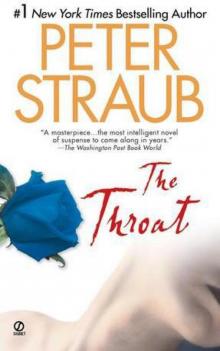 The Throat
The Throat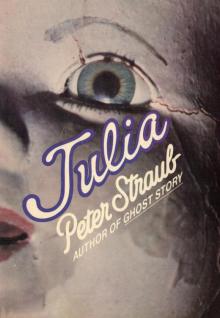 Julia
Julia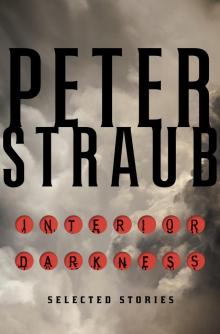 Interior Darkness: Selected Stories
Interior Darkness: Selected Stories A Dark Matter
A Dark Matter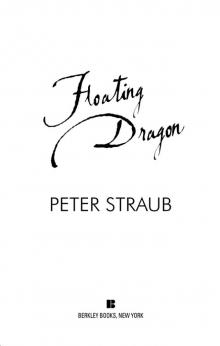 Floating Dragon
Floating Dragon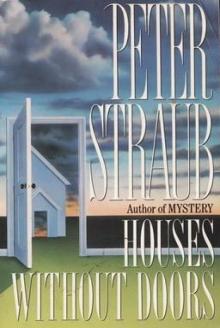 Houses Without Doors
Houses Without Doors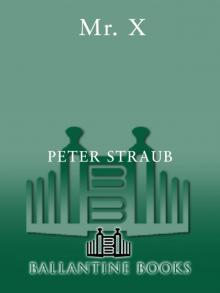 Mr. X
Mr. X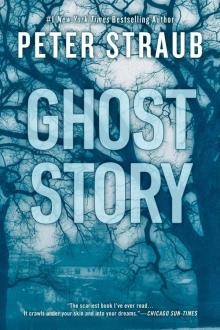 Ghost Story
Ghost Story Mystery
Mystery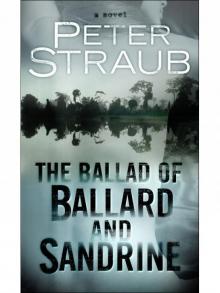 The Ballad of Ballard and Sandrine
The Ballad of Ballard and Sandrine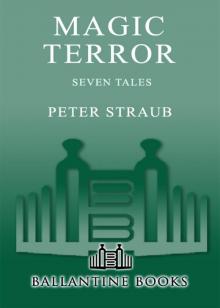 Magic Terror
Magic Terror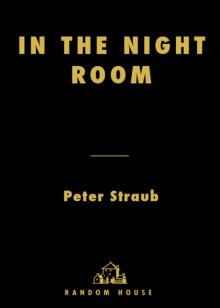 In the Night Room
In the Night Room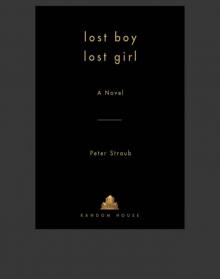 Lost Boy Lost Girl
Lost Boy Lost Girl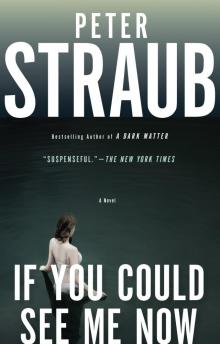 If You Could See Me Now
If You Could See Me Now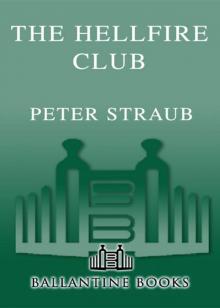 The Hellfire Club
The Hellfire Club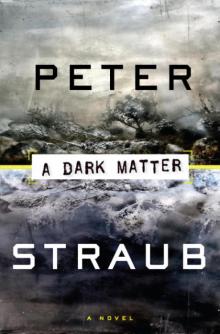 A Dark Matter: A Novel
A Dark Matter: A Novel Koko brt-1
Koko brt-1 Shadowland
Shadowland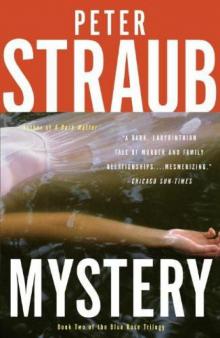 Mystery brt-2
Mystery brt-2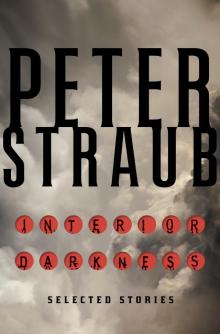 Interior Darkness
Interior Darkness Poe's Children
Poe's Children